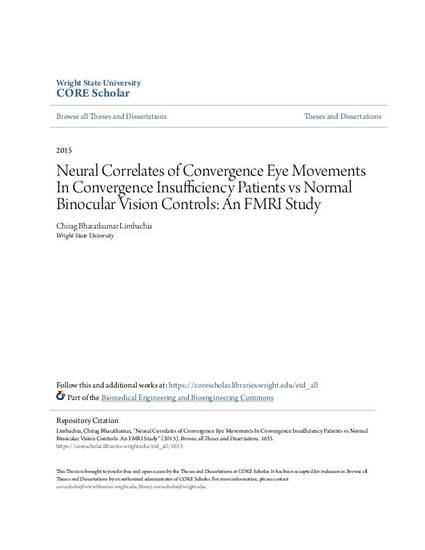
Thesis
Neural Correlates of Convergence Eye Movements In Convergence Insufficiency Patients vs Normal Binocular Vision Controls: An FMRI Study
(2016)
Abstract
Convergence Insufficiency is a binocular vision disorder, characterized by reduced ability of performing convergence eye movements. Absence of convergence causes, eye strain, blurred vision, doubled vision, headaches, and difficulty reading due frequent loss of place. These symptoms commonly occur during near work. The purpose of this study was to quantify neural correlates associated with convergence eye movements in convergence insufficient (CI) patients vs. normal binocular vision (NBV) controls, and to examine statistical differences between them. Functional magnetic resonance imaging (fMRI) scans were collected using a 3T Siemens scanner. A disparity-driven convergence task was designed using a standard block design approach, and was presented to all the subjects as a visual stimulus. Subjects performed tasks of two difficulty levels; an easy and a hard convergence task. FMRI data was analyzed using fMRI Expert Analysis Tool (FEAT) in FSL software package, and statistical data obtained from the FEAT was further analyzed in JMP to assess significant factors and interactions. Results showed significantly higher activation in the regions of interest (ROI), both in spatial extent and amplitude, of the patients compared to the controls (z-score > 2.3, p < 0.05). JMP analysis showed, hard task elicited higher activation than the easy task, in both controls and patients.
Keywords
- fmri,
- convergence insufficiency,
- vision,
- eye movement,
- binocular,
- disorder,
- brain,
- imaging
Disciplines
Publication Date
Winter January 18, 2016
Degree
Master of Science in Biomedical Engineering (MSBME)
Field of study
Brain Imaging
Department
Biomedical, Industrial, and Human Factor Engineering
Advisor
Nasser Kashou
Citation Information
Chirag B. Limbachia. "Neural Correlates of Convergence Eye Movements In Convergence Insufficiency Patients vs Normal Binocular Vision Controls: An FMRI Study" (2016) Available at: http://works.bepress.com/nasser_kashou/35/
